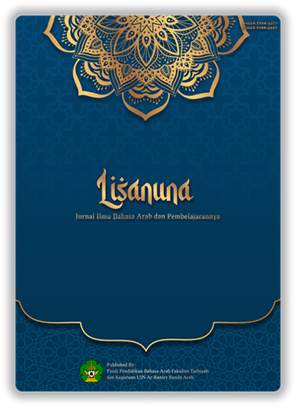إيكاندو لتعلم اللغة العربية عند الطفولة المبكرة في عصر الرقمنة 5.0 (Icando) استخدام
DOI:
https://doi.org/10.22373/ls.v13i2.18422Keywords:
Icando, early childhood, Arabic language learningAbstract
This research is motivated by an early childhood child whose educational tendencies are based on games, so this study aims to describe the Icando Platform for learning Arabic in early childhood. The research was conducted using a qualitative approach, and the source of the data came from Arabic teachers. Data were collected through observation techniques, interviews, and documentation studies. The result of the study is that Icando is an interesting educational Platform for early childhood; with this Platform they can play to learn Arabic. The researchers recommend further developing the use of various forms of Platforms that support the implementation of education in difficult conditions. The limitation of this study is that it can be carried out and its effectiveness has not been studied comprehensively, therefore this aspect has not been discussed in this study in the future work of researchers.
References
Amadi, A. S. M., & Sholikha, D. W. (2023). Perkembangan Pendidikan Bahasa Arab di Era Digital: Sistematic Literature Review. Jurnal Motivasi Pendidikan Dan Bahasa, 1(3), 301-309.
“Google Class Room Distance Education,” n.d.
Islaieh, AIS, Jailani, MRM, Zainuddin, N., Kamaruddin, WAZW, & Zakaria, Z. (2020). iLE-initiative: Platform online interaktif dalam pengajaran dan pembelajaran bahasa Arab untuk siswa berbakat. Jurnal Internasional Sains dan Teknologi Maju , 29 (6), 1317-1328.
Nadia Abbas Mohammed and Diyala Education Directorate, “The Effect of Above-Learning Exercises to Generalize the Motor Program in Mastering the Skill of Jumping Openly on The Jumping ثوحبو تاسارد ةلجم ةيضايرلا ةيبرتلا” 32, no. 2 (2022): 270–81.
Nasution, A. F. (2023). Metode Penelitian Kualitatif.
Sugiyanto, R., Diplan, D., Tinse, M., Alvionita, M., & Fitria, A. (2023). Penerapan Blended Learning pada Pembelajaran Tematik di Sekolah Dasar Daerah Aliran Sungai Kahayan Kota Palangka Raya. Journal on Education, 5(4), 13344-13355.
أميرة Ali Jumah, “The Role of Educational Media in Promoting Private Educational Institutions on Social Media Platforms - The Facebook Platform as A Model ةسستام - يعامتجيا مسسصاوتلا تاسستام ملع ةسسصاخلا” 8118, no. يونيو (2022): 189–203.
Downloads
Published
Issue
Section
License
1. Proposed Policy for Journals That Offer Open Access Authors who publish with this journal agree to the following terms:
1.a. Authors retain copyright and grant the journal right of first publication with the work simultaneously licensed under a Creative Commons Attribution License that allows others to share the work with an acknowledgement of the work's authorship and initial publication in this journal.
1.b. Authors are able to enter into separate, additional contractual arrangements for the non-exclusive distribution of the journal's published version of the work (e.g., post it to an institutional repository or publish it in a book), with an acknowledgement of its initial publication in this journal.
1.c. Authors are permitted and encouraged to post their work online (e.g., in institutional repositories or on their website) prior to and during the submission process, as it can lead to productive exchanges, as well as earlier and greater citation of published work (See The Effect of Open Access).
2. Proposed Policy for Journals That Offer Delayed Open Access Authors who publish with this journal agree to the following terms:
2.a. Authors retain copyright and grant the journal right of first publication, with the work [SPECIFY PERIOD OF TIME] after publication simultaneously licensed under a Creative Commons Attribution License that allows others to share the work with an acknowledgement of the work's authorship and initial publication in this journal.
2.b. Authors are able to enter into separate, additional contractual arrangements for the non-exclusive distribution of the journal's published version of the work (e.g., post it to an institutional repository or publish it in a book), with an acknowledgement of its initial publication in this journal.
2.c. Authors are permitted and encouraged to post their work online (e.g., in institutional repositories or on their website) prior to and during the submission process, as it can lead to productive exchanges, as well as earlier and greater citation of published work (See The Effect of Open Access).

